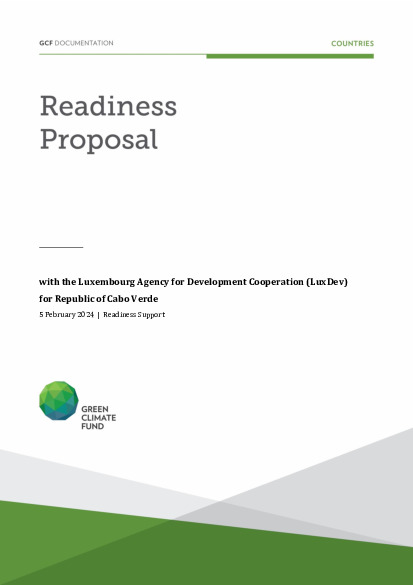Enabling Direct Access to GCF Climate Finance for Cabo Verde
The capacity to access climate finance will be a key determinant of the success of Cabo Verde’s inclusive green growth and climate agenda. Cabo Verde is working to enhance its direct access to climate finance, in particular with the GCF. To this end, the Ministry of Finance (MF), Cabo Verde’s National Designated Authority (NDA) wishes to engage in a readiness process in order to enable a national entity to be approved as a direct access entity (DAE). The present request is thus to seek support for capacity building and pipeline development in order to accelerate ambitions to implement the goals of the Paris Agreement – to foster climate resilience and low greenhouse gas emissions development – by preparing for transformational impact in a small island development state (SIDS).
This proposal aims to increase the country ownership by delivering the first national accreditation of a DAE. After a strong consultation process and a gap assessment analysis, the country has identified a potential entity which could be a candidate to advance as Cabo Verde’s first accredited DAE, but a set of aspects that are needed to make such accreditation a reality are still necessary to develop and weight against other potential candidates. Since the success of a DAE also depends on the general knowledge that the NDA and main stakeholders have on the GCF investment criteria and processes, this readiness proposal contributes to the following key outcomes:
- Outcome 1.1: Country NDAs or focal points and the network/ systems that enable them to fulfil their roles, responsibilities and policy requirements are operational and effective;
- Outcome 1.2: Direct access applicants and accredited entities (DAEs) have established capacity to meet and maintain the GCF’s accreditation standards; and accredited DAEs have the capacity to develop a pipeline of projects and effectively implement GCF-funded activities;
- Outcome 1.3: Relevant country stakeholders (which may include executing entities, civil society organizations and private sector) have established adequate capacity, systems, and networks to support the planning, programming and implementation of GCF-funded activities;
- Outcome 4.3: An increase in the number of quality project concept notes developed and submitted that target SIDS, less-developed countries (LDCs) and African states.
These outcomes aim to be able to contribute towards narrowing the following gaps and needs that exists in the country:
- Lack of NDA’s knowledge about GCF criteria associated with the issuance of the no-objection letter;
- Lack of a DAE in Cabo Verde;
- Lack of knowledge of institutions about GCF criteria and processes required for GCF project development and approval;
- Lack of capacity of institutions to engage climate finance institutions;
- Insufficient capacity of institutions to integrate gender considerations and to assess environmental and social (E&S) risks according GCF E&S safeguards policy;
- Lack of a DAE to catalyze climate finance in the water and agriculture sectors.
With this readiness support from the GCF, a capacity development programme can be executed along with support for pipeline development for the future DAE’s staff, relevant government institutions, civil society, and private sector organisations. This will support accreditation of Cabo Verde’s first DAE and improve pipeline development focused on adaptation projects, in the water and agriculture sectors. The concept notes developed will be aligned with the Country Programme that is being developed by UNIDO and with the work that FAO is also doing in the country under another GCF Readiness Proposal.
